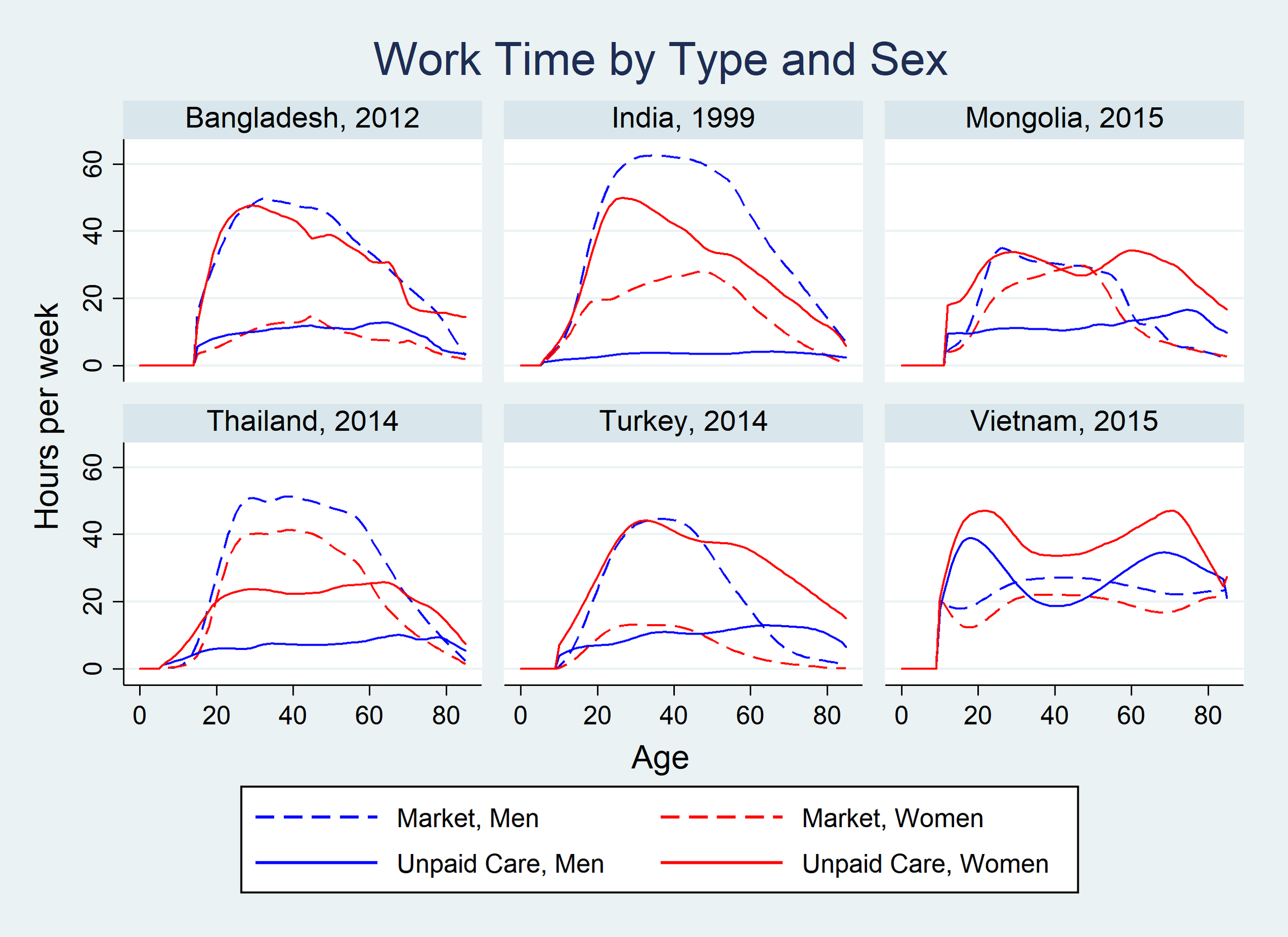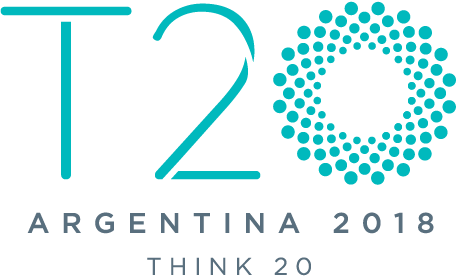"National Time Transfer Accounts: On the gender gap and unpaid work in the Global South" Online Symposium
Scholars and practitioners from around the world met online to share results on unpaid care work using the National Time Transfer Accounts framework developed by Counting Women’s Work.
Led by the Colombia NTA/CWW research team, a group of scholars and practitioners met to share their research and experience in the measurement of unpaid care work in the Global South. The discussions covered specific country results, disaggregated country results, comparative results with a few countries, lessons learned across all of the countries in the project, and a look into the role of national statistical offices in collecting data on unpaid care work and turning it into actionable results.
Speakers and Topics:
Latif Dramani, U. Thiès/CREG-CREFAT, Senegal. Presented comparative results from Senegal and Burkina Faso, demonstrating size of unpaid care work economy and how large this economy is compared to the market economy. Comparing/contrasting results from the two contries.
B. Piedad Urdinola, U. Nacional, Colombia. Deep dive into results on unpaid care work from the recently available Colombian Time Use survey of 2016-2017, with results broken down by household structure.
Jordana Jesus, U. Federal do Rio Grande do Norte, Brazil. Innovative methodology used to estimate complete set of unpaid work age profiles for Brazil using only one survey item on unpaid housework and imputed care estimates based on regional comparative data.
Gretchen Donehower, U.C. Berkeley, United States. Overview of cross-country results from CWW and what they mean for policy.
Juan Daniel Oviedo, National Statistics Office – DANE, Colombia. Described Colombia’s commitment to collecting gender data including high-quality time use surveys, and demonstrated what is learned from such data collection and how it is used by stakeholders including policymakers, researchers, and civil society.
Moderator
Jorge Tovar, U. de Los Andes, Colombia. Led the discussion into how these estimates can be used, how it shapes the global discussion on unpaid care work, and what the limitations and opportunities are from the research presented.
Time Use, Policy, and Economic Growth Online Symposium
Counting Women's Work and the Population Reference Bureau collaborated on a webinar featuring CWW country teams discussing research and policy around the world and a senior national statistician giving the perspective of someone directly involved in public policy and public statistics.
In collaboration with the Population Reference Bureau, the Counting Women’s Work project held an online webcast to explore policy applications of research into time use and unpaid care work. The discussion was policy focused, with the main questions revolving around how estimates like CWW’s National Time Transfer Accounts can impact policy. We were honored to host several speakers who are long-time participants in the Counting Women’s Work project and one chief national statistician who gave his perspective on these important issues from outside the project.
Speakers:
Morne Oosthuizen, DPRU/ University of Cape Town
Latif Dramani, CREG-CREFAT
Beatriz Urdinola Piedad, National University of Colombia-Bogotá
Juan Daniel Oviedo, National Statistics Office – DANE, Colombia
Moderators
Gretchen Donehower, Counting Women’s Work
Marlene Lee, Population Reference Bureau
In preparation for the session, the Population Reference Bureau prepared a fact sheet featuring CWW research in Vietnam, Colombia, and Senegal. The fact sheet features definitions and basic methodology and shows how CWW research helps policymakers understand gender gaps in work and income, as well as how they differ by socioeconomic status, or urban/rural residence.
CWW Care Work Projection Template at CWE-GAM Meeting
CWW PI joins the 2019 annual meeting of the Care Work and the Economy Project (CWE-GAM) in Glasgow, Scotland in July, 2018.
Gretchen Donehower, PI of CWW, participated in the 2019 annual meeting of the Care Work and the Economy Project (CWE-GAM) in Glasgow, Scotland on June 30 - July 2, 2019.
Donehower has been collaborating with CWE-GAM researchers to create a template for projecting the care economy. This involves a synthesis of both paid and unpaid care work for both children and elders, and estimating the age- and sex-specific nature of the production and consumption of care. The data needs are intensive - requiring a time use survey to estimate dynamics in the unpaid care work sector, and income and expenditure surveys to estimate dynamics in the paid care work sector.
Donehower presented presents a preliminary model which projects care support ratios for the United States through 2030. Slides from the meeting are available here. Work is ongoing to apply the model to data available in South Korea, and modify that output based on feedback from the meeting.
Click below to learn more at the project website:
Older people as unpaid care work producers at HelpAge Asia-Pacific Conference
CWW PI at HelpAge Asia-Pacific Regional Conference, focus on older women as care producers
Gretchen Donehower, PI of CWW, participated remotely in the HelpAge Asia-Pacific Regional Conference in Tehran, I.R. Iran, October 23-25, 2018. The focus of the conference, from the conference website, was "Family, Community and State in Ageing Societies - Demographic ageing is having profound impact on societal dynamics in Asia. The functions of the family, communities and governments are changing rapidly. How they can reinforce each other, and how they relate with longer periods of independence in old age, will need to be re-examined.”
Donehower presented research on time transfers in Asian countries, showing that women produce unpaid care work and transfer it to family and community members until the oldest age groups we observe. This means that aging societies have more productive potential than usually considered. It will take the right policies to enhance this potential and ensure the well-being of older persons and aging societies.
The conference paper can be accessed here.
Average time spent working at each age by type of work and sex, hours per week.
CWW Collaborates with Care Work and the Economy Project
Researchers from CWW will join the 2018 annual meeting of the Care Work and the Economy Project (CWE-GAM) in Berlin, Germany in October 21-23, 2018.
Researchers from CWW, including Principal Investigator Gretchen Donehower, Project Coordinator Morné Oosthuizen, and CWW Ghana research team leader Professor Eugenia Amporfu will join the 2018 annual meeting of the Care Work and the Economy Project (CWE-GAM) in Berlin, Germany in October 21-23, 2018.
The CWE-GAM project has three main aims:
To develop innovative tools to measure and model care,
To develop gender-aware macromodels (GAM) that integrate gender and care work into the applied economic tools at the heart of economic policymaking, and
To rethink macroeconomic models so that they include gender and unpaid care work as essential elements of understanding economies in a more complete way for more accurate understanding and policy analysis.
Given CWW’s focus on measurement as well as our global reach, collaboration with CWE-GAM is a natural fit. Donehower, Oosthuizen, and Amporfu will attend the meetings, provide feedback on project plans and outputs, and discuss possibilities for further collaboration in the future.
Click below to learn more at the project website:
CWW Takes Part in G20 Task Force on Gender Economic Equity
Counting Women's Work collaborated with a task force on Gender Economic Equity to make sure that discussions of women’s economic empowerment included evidence from both the market and household economies.
While Argentina holds the Presidency of the G20, or “Group of Twenty,” Argentinian officials and researchers have been coordinating several task forces to ensure that a diverse set of issues and viewpoints are represented in the talks. They call this effort the “Think 20” or “T20” group of task forces and the list of all topics appears here.
Counting Women’s Work was invited to be part of the task force on Gender Economic Equality and the project was represented by Mexico CWW team leader Estela Rivero Fuentes. Dr. Rivero Fuentes used CWW research to highlight the role of unpaid care work in creating gender inequality in access to market labor force opportunities. In addition, she was a contributing author to the Task Force’s volume on Gender Economic Equity: An Imperative for the G20. This represents one of the highest-level policy interactions for CWW.
After a meeting of the task force in September 2018, the T20 produced a comprehensive document that covers the current empirical reality of gendered economies around the world, as well as a set of specific policy recommendations that will be presented during the G20 summit in Buenos Aires in November 2018. This will be the first G20 summit held in South America.
Categories
Tags
- Africa 3
- Asia 3
- Audio 2
- Brazil 1
- Burkina Faso 2
- Colombia 10
- Costa Rica 10
- Covid19 2
- Cross-country 19
- El Salvador 1
- Europe 5
- Example Code 1
- Fertility 2
- Gender Dividends 3
- Ghana 4
- Hispanic ethnicity 1
- Human Capital 1
- Hungary 1
- India 3
- Kenya 2
- Latin America 7
- Mauritius 2
- Methodology 6
- Mexico 4
- Policy-related 10
- Senegal 5
- Slides 10
- Slovenia 1
- South Africa 9
- South Korea 2
- Spain 2
- Spanish language 4
- Turkey 1
- United States 3
- Uruguay 2
- Video 7
- Vietnam 4
- Web Conference 4










